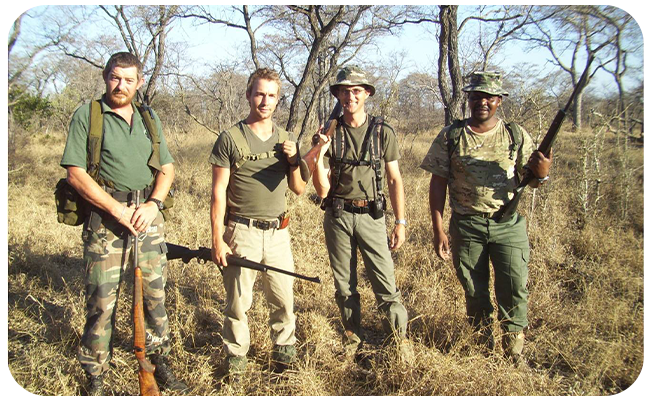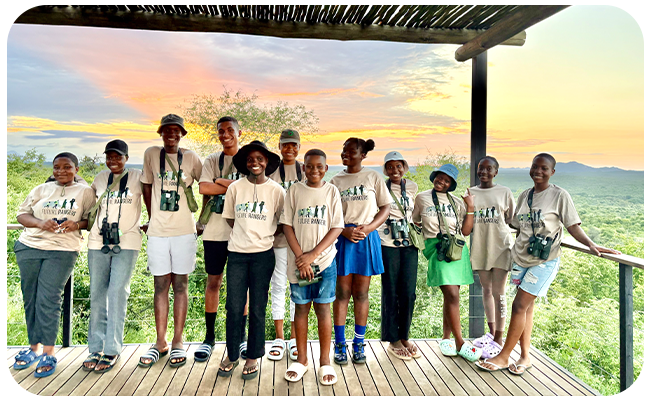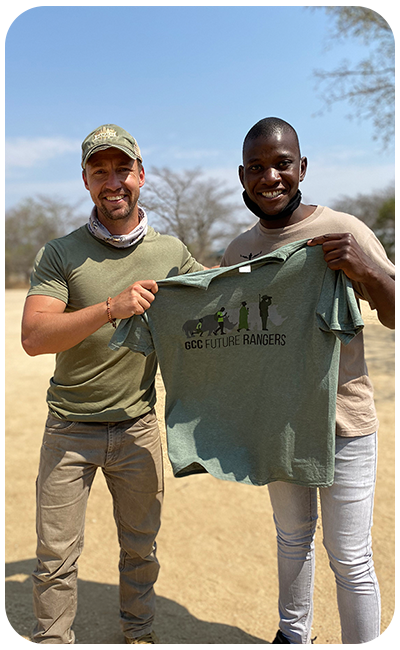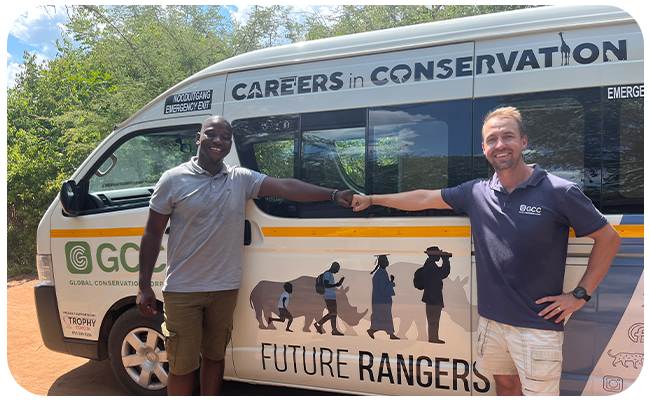
The Global Conservation Corps (GCC) was founded in the height of the South African rhino poaching crisis in 2015. With a committed board of friends, I originally founded the organisation to pay tribute to my fallen mentor, Martin Mthembu; one of the most revered field ranger trainers in the history of the African continent.During his life, Martin trained over 15,000 rangers in some of the most biodiverse and threatened national parks. He instilled in local communities the skills, confidence and toolsets to protect their wildlife. He was also a father-figure to many wandering youth. I was one of them. When Martin passed on the 2nd of August 2014, a massive void fell upon the ranger community, and the conservation space at large. Martin saved my life three times in the field, and with that knowledge, I wanted to ensure that his memory, mission, and ambition for investing in Africa’s youth endured.
Disconnection
 To honour Martin, our first project was RHINO MAN, a story about the brave rangers and their commitment to protecting the world’s wildlife. The protagonist in this film was a great friend of Martin’s and mine; the late Sergeant Anton Mzimba. During filming in 2017, Anton shared that his greatest fear wasn’t losing the rhino, but rather that his own children might never see a rhino. Anton shared that the majority of youth bordering protected areas had never seen wildlife, and without that love for nature, local youth would not fight to defend the natural world. Shocked with this information, GCC interviewed over 500 students living along the western border of Kruger National Park, uncovering that four out of five youths polled had never seen wildlife.
To honour Martin, our first project was RHINO MAN, a story about the brave rangers and their commitment to protecting the world’s wildlife. The protagonist in this film was a great friend of Martin’s and mine; the late Sergeant Anton Mzimba. During filming in 2017, Anton shared that his greatest fear wasn’t losing the rhino, but rather that his own children might never see a rhino. Anton shared that the majority of youth bordering protected areas had never seen wildlife, and without that love for nature, local youth would not fight to defend the natural world. Shocked with this information, GCC interviewed over 500 students living along the western border of Kruger National Park, uncovering that four out of five youths polled had never seen wildlife.
These students could hear lions roaring or had heard tales from their grandparents about grazing their cattle with buffalo but had never directly connected with their natural heritage. This widespread division originates from the separatist past of South Africa, where local communities were forced out of Kruger in the 1960s to make space for exclusive wildlife areas. While conservation was prioritised, the people were not, and now more than 60 years later, restrictive fences, relatively high park entry fees and lack of access to transport keeps many people on the border of Kruger excluded from the natural world. This disparity translates further than just wildlife-related differences but permeates throughout the socio-economic landscape at large. Poverty, unemployment and crime rates continue to rise; all contributing towards an increase in the illegal wildlife trade. Delivering on equity is paramount, which is one of the five themes at this year's IUCN World Conservation Congress in October, because if people aren’t prioritised, neither will wildlife.
Future Rangers Programme

With this human-centred lens towards conservation, the Future Rangers Programme (FRP) was born; an educational mechanism for youth to build the passion, skills and connections to follow careers in conservation, ultimately benefiting from wildlife and advocating for its continued existence. The FRP connects with youth from five years of age, all the way to post-graduation. In the primary schools, our educators are tasked with one thing: make conservation cool! Every single student has the opportunity to partake in a game drive in a Big 5 area, usually with our incredible partners at the Southern African Wildlife College, Koru Camp, or the Timbavati Private Nature Reserve. As students’ progress into high school, the FRP has an after-school format, where we focus on the top 10% of students who are seeking conservation careers. From grades 8-11, students receive weekly lessons from our education team and once a quarter go on various field trips and leadership camps for exposure to various career pathways in the sector. In the final year of grade 12, we only accept five learners per school and pair them up with aligned mentors and internship opportunities. The ultimate goal is for our graduates to achieve further educational opportunities, internships and ultimately employment, becoming local leaders in the conservation sector.
The next generation of leadership

In 2020, during the height of the Covid Pandemic, GCC ran a scholarship for deserving youth to qualify as field rangers at the Southern African Wildlife College. Over 500 people applied within 48 hours! We interviewed the top 120 candidates and from there 41 individuals were invited to attend selection. Over the course of a gruelling selection week (watch RHINO MAN to see more), the top 15 candidates emerged and received the six-week armed field ranger training qualification.
On graduation day, the class president walked over to me and thanked GCC for this life-changing opportunity. This man’s name is Mbhoni Mzamani and he forever changed my life. I knew in that moment (pictured above) that this was someone who was here to change the world. A few weeks later, GCC offered him a position to join our team. Mbhoni and I shared a theory that most youth had no idea about the variety of career opportunities that existed on their doorstep, especially within the greater wildlife economy. Once again, we conducted a survey of over 500 students and found that the average student could only list three possible careers in conservation (a guide, ranger, or housekeeper). To add more complexity to the situation, CV19 forced all schools to be closed, meaning we couldn’t access the students in the classroom. An entire world of possibility existed just behind the veil for thousands of youths, and we knew something needed to change. This is where the Careers in Conservation YouTube Series was born. Mbhoni took the role of host (you’ll see why) and producer, while I took up a director position. We brought in an incredibly talented filmmaker, Justin Sullivan, as the DP and hired Vusi Mathe and Zac Holben as the editing team. As a unit, we created something which had not been done before in the region. We leveraged the disruptive power of media to promote Innovation and Leadership for Conservation - another one of the themes at this year's IUCN Congress. This was the first conservation series exclusively produced in the local language of Xitsonga, spoken by more than four million people. We exclusively interviewed conservation professionals who were from the same regions as the students we sought to inspire, producing 11 unique episodes in our first season.
Within six months of launching, over 50,000 students along the border of Kruger Park engaged with our content. After conducting post surveys, we found a significant positive increase in the youth’s perception of wildlife and a marked increase in their desire to pursue a local career in conservation. But instigating passion was only the beginning. How would we support students to bridge the gap between their newly found passion for nature and tangible employment?
Vumba: Impact at scale


As is the natural evolution of working in the NGO space, the more we learn, the more we uncover. To date, we’ve seen over 15,000 students impacted by our programming. However, we’ve experienced massive challenges in tracking these students, identifying the shining stars and being able to measure our actual impact as an NGO. We’ve also struggled to source curriculum resources, to understand where partner NGOs are working and failed to track our students post-graduation. After consulting with our partners, we discovered that dozens of NGOs across Africa were struggling with the same issues.
To address this systemic issue, we built Vumba, an education delivery platform that allows GCC (and partner NGOs) to track the progress of not just their programmes, but individual students and their learning journeys. For the first time in this region, students are able to prove their conservation achievements in a digital portfolio of evidence, which amplifies top achievers to find employment when they graduate. We’ve leveraged the powerful advantages of technology to reduce barriers for youth to enter the workforce, by proving their learning achievements, academic results and skills developed. This missing puzzle piece supports employers to identify emerging talent in a local workforce and creates equity in local wildlife economies.
The future

As GCC turns 10 on the 31st of May 2025, we recognise the incredible leadership that has supported our work to date. Legends like Martin, mentors like Anton and innovators like Mbhoni are the reason we’re here today. As we approach the Global Biodiversity Framework 30x30 conservation target, it's our collective responsibility to listen to the legacies of these heroes and to create enabling environments for the next generation of leadership to emerge. As we will discuss at the IUCN Congress later this year, what this world desperately needs now are visionaries with one foot firmly rooted on the ground and the other foot reaching for a brighter future, for both people and wildlife.
Yours in Conservation,
Matt Lindenberg
Executive Director
Global Conservation Corps
IUCN Commission on Education and Communication Member 2021-2025
